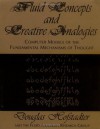251
Followers
4
Following
Manny Rayner's book reviews
I love reviewing books - have been doing it at Goodreads, but considering moving here.
Currently reading
The Greatest Show On Earth: The Evidence For Evolution
R in Action
Fluid Concepts and Creative Analogies
McGee on Food and Cooking: An Encyclopedia of Kitchen Science, History and Culture
Epistemic Dimensions of Personhood
Pattern Recognition and Machine Learning (Information Science and Statistics)
Relativity, Thermodynamics and Cosmology
The Cambridge Handbook of Second Language Acquisition
 The second volume of Kasparov's magnum opus covers Euwe, Botvinnik, Smyslov and Tal, who were World Champions between 1935 and 1963. In contrast to Volume 1, this one is mostly about people the author knew well. The tone is correspondingly more personal; particularly since the central figure, who towers above the rest, is Mikhail Botvinnik, three times World Champion and Kasparov's great teacher. Kasparov's father died when he was only seven, and one gets the impression that Botvinnik was in many ways the father-figure in his life. During this period, chess was dominated by the Soviet School. Botvinnik and his contemporaries spent their most active years under Stalin, who, like Lenin, was a keen chessplayer.
The second volume of Kasparov's magnum opus covers Euwe, Botvinnik, Smyslov and Tal, who were World Champions between 1935 and 1963. In contrast to Volume 1, this one is mostly about people the author knew well. The tone is correspondingly more personal; particularly since the central figure, who towers above the rest, is Mikhail Botvinnik, three times World Champion and Kasparov's great teacher. Kasparov's father died when he was only seven, and one gets the impression that Botvinnik was in many ways the father-figure in his life. During this period, chess was dominated by the Soviet School. Botvinnik and his contemporaries spent their most active years under Stalin, who, like Lenin, was a keen chessplayer. Mostly, Kasparov talks about Botvinnik's contributions to chess. He considers that he was one of the three truly great World Champions (the other two being Steinitz and Fischer), and transformed the nature of the game with his impartial, scientific approach. Twice, he lost the title, made a thorough study of his opponents' weaknesses, and then won the return match on his deeper understanding. Kasparov describes the process from his own unique viewpoint, and one cannot help being extremely impressed. Botvinnik's lucidity of thought was remarkable. But you constantly feel Stalin there in the background. I'm guessing that people reading this review will, on the whole, find the political and human side more interesting than the chess, so I'll focus on that.
There is no doubt that Botvinnik supported Stalin, and believed he was the hero who won World War II for the Allies. Kasparov, who is absolutely not a Stalinist, tries to show you how it was possible for someone to admire this brutal dictator, to accept many favors from him, and still to be a decent, honest person with a strong sense of right and wrong. On the one hand, Botvinnik was the darling of the Soviet Communist Party, who accorded him all sorts of unusual privileges - his wife was even allowed to accompany him to tournaments in the West! An even more striking example: just before the outbreak of the war, Botvinnik wanted to enter negotiations with Alekhine for a world title match. He of course had to ask his superiors for permission, and it seems likely that the positive reply was dictated by Stalin himself. And despite this, he somehow still managed to stay true to his own ideals, and maintain his sense of his own worth.
The Soviet authorities were only too keen to help Botvinnik in any way possible, and I found it interesting to see which forms of help he was prepared to accept, and which he refused. The match with Alekhine never happened; Alekhine died still holding the title, and the World Chess Federation decided that the new champion would be the winner of a match-tournament between the world's five strongest players. Play was split between The Hague and Moscow. On the way to Moscow, Euwe, who had previously been a tough opponent for Botvinnik, had his notebooks confiscated by the customs officials, who (they claimed) thought that the chess moves might be code. Botvinnik intervened, and had them returned to him. Euwe was grateful, but it appears that the contents were copied, and his secrets were passed on to the Soviet players. On the other hand, Botvinnik adamantly refused several offers to have other Soviets throw key matches to him; he made it clear that he would resign games he thought were being fixed in his favor. Despite being Jewish, he was also one of the few prominent Soviet Jews who did not sign the infamous letter denouncing the "Doctor's Plot". Kasparov, clearly impressed, says he does not know how he managed this.
The most memorable episode is the 23rd game of Botvinnik's 1951 match against Bronstein. One down with two to play, Botvinnik desperately needs a win. The game is adjourned in a complex endgame, where he has chances, but everything depends on his sealed move (the last move of the session, written down and put into a secret envelope). Flohr, Botvinnik's second, is watching, and becomes more and more excited; if Botvinnik has sealed Bb1, he looks like he's doing very well! When Botvinnik leaves the hall, Flohr runs up to him, and tells him his thoughts. Botvinnik thanks him, but says he's tired; he'll look at the analysis in the morning. Flohr works all night, and next day tells Botvinnik that it's as he suspected. Bb1 wins in all variations, and he can prove it. He tries to show the lines to Botvinnik, and is surprised at how little interest he shows; probably he's figured it all out himself, but wouldn't it be safest to go through the material together? And it's only as they go back into the playing hall that Botvinnik turns to him and, "with his customary, mechanical intonation", says that in fact Flohr has wasted his time; he sealed a different move. Flohr, exhausted and overwrought, breaks down and cries openly. But Botvinnik still manages somehow to win the game, and retains his title.
As Kasparov says: what a dreadful story. Not to be able to trust anyone, not even your closest friend, for fear that he will betray you. Somehow, more than anything in Solzhenitsyn, this brought home to me what it was what was like to live in Stalin's Russia.











